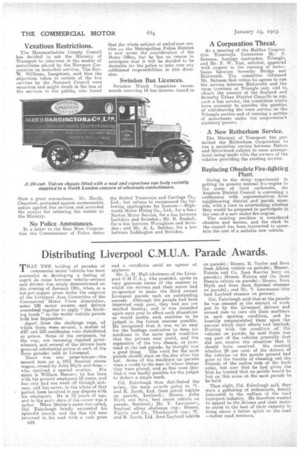Distributing Liverpool C.M.U.A. Parade Awards.
Page 8

If you've noticed an error in this article please click here to report it so we can fix it.
THATTHE holding of parades of commercial motor vehicles has beensuccessful in developing a feeling of esprit de corps between vehicle-'owners and drivers was amply demonstrated on the evening of January 12th, when, at a hot-pot/supper given under the auspices of the Liverpool Area Committee of the Commercial Motor Users Association, some 120 motor owners and drivers assembled together to apply "the finishing touch" to the motor vehicle parade held last September.
Apart from the challenge cups, of which there were several, a matter of
67 and 220 certificates were distributed as prizes. Some of the recipients, by the way, are becoming reputed prize. winners, and several of the drivers have seceived substantial prizes at each of the three parades held at Liverpool. There was one prize-winner—the second man on a 1913 Sentinel steam wagon, owned by John Blyth and Sons--who received a epecial ovation. His name is William Mercer; he has been with his present employers 53 years, and has only had one week off through sickness, and has never, in the whole of that period, been involved in any dispute with his employers. He is 73 years. of age, and in the early days of his career was a carter. When Mercer's name was called, Col. Fairclottgh briefly recounted his splendid record, and the fine old man returned to his seat with a cash prize
B22 and a certificate amid' an uproar of applause.
Mr. L. H. Hall (chairman of the Liverpool C.M.U..1.), who presided, spoke in very generous terms of the manner in which the drivers and their mates had co-operated to make the third annual Liverpool parade such an outstanding success. Although the parade had been improved each year, they had not yetreached finality, and it was intended again next year to effect such alterations as would enable each machine to be judged in the fairest manner possible. He recognized that it Was no so easy for the haulage .contractor to keep his machines in the samegood condition that the private user could, and the separation of the two classes, as practised at the last parade, he thought was a good thing. The work for the next parade should start on thesday after the last. Some of the machines on :parade were a credit to the men in whose charge they were placed, and so fine were they that it was hardly possible for the judges to deduct a single mark.
Col. Fairclough then distributed the prizes, the main awards going to V. and R. Jacob, Ltd. (best petrol vehicle on parade, Leyland); Messrs. John Blyth and Sons, best steam vehicle on parade, Sentinel); Mr. T. Lawrensers, Sentinel silver challenge cup; Messrs. Fairrie and Co., Thornycroft cup ; W. and R. Jacob, Ltd. (best Leyland, vehicle on parade); Messrs. R. Taylor and Sons (hest Albion vehicle on parade); Messrs. Fairrie and Co. (best Karrier lorry on parade); Messrs. Fairrie and Co. (best Dennis vehicle on parade); Messrs. Joan Blyth and Sons (best Sentinel steamer on parade); and Mr. T. Lawrenson (the best Leyland steamer on parade).
Col. Fairclougli said that at the parade he wa.s amazed at the amount of work put in by the Liverpool drivers and second men to tarn out their machines: in such spotless condition, and he heartily congratulated them upon the success which their efforts. had merited. Dealing with the condition of the vehicles on parade, he said there was one part of the vehicles generally that did not receive the attention that it should: have received. He doubted whether 20 per cent. of the drivers of the vehicles on the parade Found had gone to the trouble of cleaning out, the threads of the radius rods of the back axles, but now that he had given the hint, he trusted that no points would be lost on this score at the next parade to be held.
That night, Col. Fairclough said, they were a gathering of enthusiasts, keenly interested in the welfare 'of the road transport industry. He therefore wanted to appeal to the drivers and their mates to assist to the best of their capacity to bring about a better spirit on the road —better road manners.
































